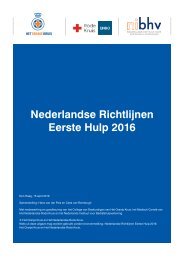Thesis-Anne-Vos-Masters-SBR-and-EU-Law-3
Thesis-Anne-Vos-Masters-SBR-and-EU-Law-3
Thesis-Anne-Vos-Masters-SBR-and-EU-Law-3
You also want an ePaper? Increase the reach of your titles
YUMPU automatically turns print PDFs into web optimized ePapers that Google loves.
integrations, the best available knowledge <strong>and</strong> the precautionary principle). This concept (<strong>and</strong> its<br />
impact assessment) could thus be seen as a confirmation of the considerations hereafter.<br />
The first problem concerns the fragmented nature of shale gas regulation. Here come different<br />
principles into play: the decentralisation, integration, precautionary <strong>and</strong> prevention principle. The<br />
decentralisation principle would require the lower competent authorities to be involved at an earlier<br />
stage, e.g. already when permitting the exploration <strong>and</strong> extraction licenses according to the Mining<br />
Act. Currently, these lower authorities (especially the municipalities) are not involved in the Mining<br />
Act. The inclusion of those lower authorities in the Mining Act would enhance coordination <strong>and</strong> will<br />
also speed up the process. Second, the principle of integration requires environmental<br />
requirements to be implemented in other fields. This requires the Mining Act to take account of<br />
those requirements, which is currently not happening. This could enhance the currently existing<br />
different assessment frameworks. Moreover, the environmental principles also contradict with the<br />
currently fragmentised nature of the shale gas regulation. Fragmentised regulation could lead to<br />
gaps, which can harm the environment. A more centralised, clear legislation could contribute<br />
hereto. The environmental principles have in the past already been used as an argument to e.g.<br />
adopt shale gas activities in the EIA directive.<br />
The second problem which is very important for shale gas activities is the lack of public trust <strong>and</strong><br />
acceptance within the <strong>EU</strong> <strong>and</strong> the Netherl<strong>and</strong>s. The principles of decentralisation, openness<br />
(participation <strong>and</strong> transparency), integration, precautionary <strong>and</strong> prevention can be of help here.<br />
The lack of transparency <strong>and</strong> public information is considered as one of the biggest challenges with<br />
regard to shale gas. The first principle that could be helpful is the decentralisation principle. If lower<br />
authorities (mainly the municipalities) would have more influence (e.g. already in the Mining Act as<br />
stated before), citizens would have the feeling that their interests would be more <strong>and</strong> better<br />
involved. This will lead to more acceptance. Currently, many citizens feel that the Minister of<br />
Economic Affairs does only take national interests (such as the security of energy supply <strong>and</strong><br />
energy mix) into account, while not considering the local interests. Second, the principle of<br />
openness could contribute to more public acceptance <strong>and</strong> trust. In accordance with the principle,<br />
citizens should be more involved <strong>and</strong> should be allowed to see what the actual effects are of shale<br />
gas activities, what chemicals are put into the ground (or not), etc. Knowing will give some peace<br />
of mind. Third, the integration principle requires environmental requirements to be taken into<br />
account in all policies. Currently, there is lack of such integration in the Dutch mining regulation.<br />
This is shown by the Mining Act but also by the fact that only the Minister of Economic Affairs signs<br />
the official documents of the parliament, without coordination with the Minister of Infrastructure <strong>and</strong><br />
Environment. It could lead to public acceptance if environmental aspects would (more clearly) be<br />
taken into account. Currently it seems that economic reasons have the upper h<strong>and</strong>. Finally, the<br />
environmental principles are of relevance. Here, the concept of sustainable development could<br />
also be taken into account. Strict application of these principles can work as an assurance for<br />
citizens that risks are strictly taken into consideration.<br />
Third, the environmental concerns (in general) should be discussed, for which the transparency<br />
principle, the integration principle <strong>and</strong> the environmental principles are relevant. Here another<br />
problem – the protection of drinking water – can also be addressed. The same principles could<br />
contribute to the resolving hereof. First, in order to contribute to environmental concerns (under<br />
which the issue of drinking water) it is necessary that information is available, e.g. on possible<br />
earthquakes, the pollution of ground <strong>and</strong> drinking water, the amount of water used, the emission of<br />
greenhouse gas, air pollution, etc. Currently all this information is a bit vague <strong>and</strong> companies do<br />
not publish this information. This is also a concern often heard in the US. This information should<br />
be made public in order to deal with those concerns adequately. This is especially relevant for<br />
drinking water companies. Those companies need to know what chemicals are used in the<br />
fracturing fluid in order to safeguard the drinking water, especially since they are under a duty of<br />
care. The necessity of providing safe <strong>and</strong> healthy drinking water is also apparent from it being a<br />
99



